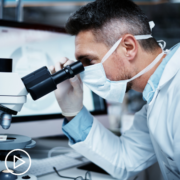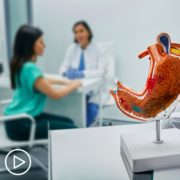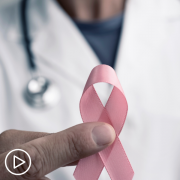How Is Gastric Cancer Screening and Care Impacted by Culture?
How Is Gastric Cancer Screening and Care Impacted by Culture? from Patient Empowerment Network on Vimeo.
How can culture impact gastric cancer screening and care? Expert Dr. Jun Gong from Cedar-Sinai Medical Center discusses solutions for improving screening rates and patient advice for reducing barriers.
[ACT]IVATION Tip
“I think one of the most important things is always for providers to be culturally aware that certain ethnic groups may have certain preferences with how news is delivered, how news is handled, how treatment is decided upon.”
Download Resource Guide | Descargar guía de recursos
See More from [ACT]IVATED Gastric Cancer
Related Resources:

|

|

Do Gastric Cancer Risk Factors Differ Among Hispanic Communities? |
Transcript:
Lisa:
Dr. Gong, how do cultural beliefs and practices impact the prevention, diagnosis, and treatment seeking behavior of individuals with stomach cancer? And how can healthcare providers better address the cultural barriers to care?
Dr. Jun Gong:
Cultural beliefs have a huge impact on access to care in stomach cancer, and I think we can do better with addressing cultural barriers to care. I think one of the innovations here at our center is that we have a center of community outreach and a disparities core here where we recognize that certain cultures and this can expand beyond Asians and Hispanics into all racial groups, that there’s a heavily…there’s an important influence of church in this sector here.
And so what we do is we actively engage leaders in the churches, in the local churches for Asians, Hispanics, and a lot of different other subgroups. And we find this a great, great relationship and partnership to have for promoting awareness and educating patients about resources that we have within a culturally specific location where patients and family members find a great deal of trust in the church.
And we also have other innovations as well. So this is more from…more of a day-to-day lifestyle from a clinical trial, a research perspective here at Cedars, we also have a designated specialist from a diversity and inclusion research group where we actually move along the disease groups from stomach cancer to colon cancer to other cancer types.
And we have this specialist sit in, usually in our weekly meetings. And whenever there is a new study, a new clinical trial, this diversity inclusion specialist will raise the question, what racial groups, ethnic groups will be of interest to hear? And how can we expand outreach and participation in these clinical trials? So these are some of the innovations that I think we can do to address cultural barriers to care.
Lisa:
Dr. Gong, do you have an activation tip?
Dr. Jun Gong:
So, my activation tip is that yes, there are growing and emerging concepts to address cultural barriers. I think one of the most important things is always for providers to be culturally aware that certain ethnic groups may have certain preferences with how news is delivered, how news is handled, how treatment is decided upon.
And additionally, I think it’s important for patients and providers to promote awareness and education in a setting where patients and family members are very comfortable with. This can be the church setting as we recognize the importance of this in the day-to-day lives of many patients and family members across multiple cultures.










